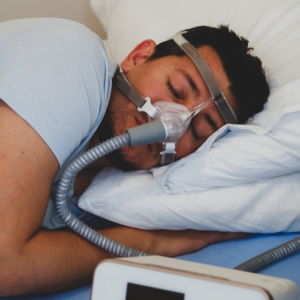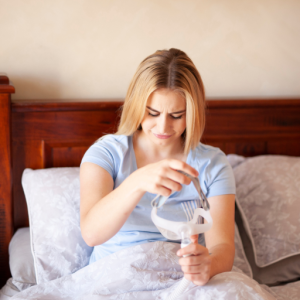Leaky CPAP Mask? Four Tips to Keep Your CPAP in Working Condition
 It’s National Sleep Awareness Month and a good time to remind people affected by snoring that CPAP (continuous positive airway pressure) therapy is an effective and key treatment for sleep apnea. But once you are used to a quiet night’s sleep with assistance from your CPAP machine, a leak can be a noisy and unwelcome development.
It’s National Sleep Awareness Month and a good time to remind people affected by snoring that CPAP (continuous positive airway pressure) therapy is an effective and key treatment for sleep apnea. But once you are used to a quiet night’s sleep with assistance from your CPAP machine, a leak can be a noisy and unwelcome development.
“Mask leaks can be a significant problem in treatment,” said Sarah Frey with Memorial Home Medical Supply. “A leak can be detected by a hissing or whistling noise or waking with a dry mouth or sore throat. Air can also rush into the eyes upon exhalation, causing dry eyes.”
Frey recommends the following tips for optimum mask usage for a good night’s sleep and improved overall health.
Ensure your mask is clean. You should clean your CPAP (mask, cushion, headgear) every day. If your mask used to fit properly but now is leaking, dirt or oils from the face may be causing the seal to work improperly. Cleaning your mask as well as the CPAP machine is simple and quick. You can clean your machine and supplies with warm water and mild soap, or for easy cleaning, CPAP mask wipes are available for purchase.
Place your mask on for the night after lying down. The mask seals properly when first placed on the face, but as you sleep, your facial muscles relax, causing the mask to leak slightly. To help, try putting your mask on once you are in the sleeping position and ready to rest. Your mask should fit comfortably snug, but not tight.
Make sure your mask choice is right for your sleeping position.
Before purchasing a mask, be sure to try on various styles and sizes. Consider your face shape and the position(s) you may sleep in.
- Side sleepers: A nasal mask or nasal pillow mask is recommended.
- Stomach sleepers: A nasal pillow mask is most appropriate. Their low profile makes them less likely to become dislodged or cause pain.
- Active sleepers: Choose a nasal mask with connections at the top of the head to help prevent the hose from becoming entangled as you move during sleep.
 Replace your cushion or mask. In some cases, cleaning the mask does not fix the issue. If that is the case, you may need to replace the cushion or even the mask itself.
Replace your cushion or mask. In some cases, cleaning the mask does not fix the issue. If that is the case, you may need to replace the cushion or even the mask itself.
At Memorial Home Medical Supply, our team of respiratory therapists and technicians will help with your sleep therapy needs.
Related Articles
Wake Up to the Importance of Quality Sleep
Snoring: Serious or Merely Annoying?